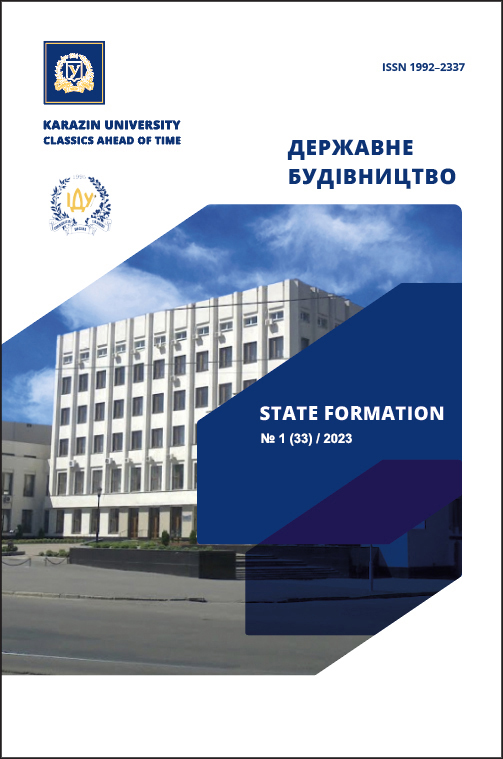ELECTRONIC PETITIONS AS A MEANS OF IMPLEMENTING THE PRINCIPLES OF PUBLIC GOVERNMENT AND A RESOURCE FOR IMPROVING STATE GOVERNMENT
Abstract
The issue of the importance of electronic petitions as a means of implementing people's power and a resource for improving state governance is considered. A petition (from the Latin petitio - "appeal") in the general sense is a collective request submitted to state authorities or local self-government bodies in written or electronic form. An electronic petition in the general sense is a special form of expression of a request or proposal submitted by a certain subject and addressed to a state authority or the head of state. The positive qualities of electronic petitions traditionally include simplicity and convenience, saving time and simplifying the bureaucratic procedure in its design and processing. The modern information society contributed to the qualitative improvement of the procedure or mechanism of registration of such a form of appeal, which can be submitted in electronic form. This is a certain appeal with a specific problem, placed on a special electronic platform, where people get the opportunity to support this or that request or demand, without spending a significant amount of time and using only the Internet. Since the 1990s, research mediated by the Internet has gradually become widespread in the social sciences due, in particular, to the expansion of the use of the Internet in various spheres of social relations. Among them, online petitions are increasingly used today. The mentioned problems are analyzed quite vividly on the pages of professional literature. The necessary circle of specialized literature is analyzed. On the basis of historical and historical-comparative methods, the specifics of initiating petitions to state authorities have been clarified. It was noted that the full implementation of this form of appeals presupposes the presence of a certain maturity of social relations and the development of parliamentarism. Peculiarities of submitting petitions in paper and electronic forms are compared. It is emphasized that the introduction of the practice of submitting electronic petitions is based on the achievements of the modern information society and the possibilities of digitalization of any documents. The position regarding the significance of the petition institute in the process of development of modern democratic governance is formulated and substantiated. According to our assessment, in this case, the first thing should be about significant innovations in the rights and freedoms of citizens, as well as in the implementation of the principles of people's rule and in approaches to state governance in general. In addition, a popular electronic petition can receive wide coverage in both traditional media and social networks. It is known that the main advantages or positive qualities of submitting this form of petitions include convenience, since the need to physically collect signatures in support of one's proposal disappears, and the possibility of simplified communication with officials or state authorities. However, in a successful case, more important importance should be attached to the significance of electronic petitions in the field of social and political-legal relations as a whole. First of all, this concerns the implementation of the right of citizens to participate in the management of state affairs, the meaningful filling of the concept of electronic governance, as well as the place of such appeals in the sphere of clarification and development of state policy. It was noted that the full implementation of this form of appeals presupposes the presence of a certain maturity of social relations and the development of parliamentarism. The main advantages or positive qualities of submitting electronic petitions include convenience, since the need to physically collect signatures in support of one's proposal disappears, and the possibility of simplified communication with officials or state authorities
Downloads
References
Zaret,David. (2019). Petition and Response and Liminal Petitioning in Comparative.Social Science History. Vol. 43.:3. Р. 431–451.DOI: https://doi.org/10.1017/ssh.2019.16
Miller, Henry.(2018). Petitioning and Demonstrating.The Oxford Handbook of Modern British Political History, 1800–2000, ed. David Brown, Robert Crowcroft and Gordon Pentland. Oxford.Р. 454–467.
Navickas, Katrina (2022). The Contested Right of Public Meeting in England from the Bill of Rights to the Public Order Acts. Transactions of the Royal Historical Society. Vol. 32. Р. 199–221. DOI: https://doi.org/10.1017/S0080440122000032
Hofmann, Sara; Østergaard Madsen,Christian and Bettina Distel (2020). Developing an Analytical Framework for Analyzing and Comparing National E-Government Strategies. Electronic Government. 19th IFIP WG 8.5 International Conference, EGOV. Linköping, Sweden, August 31 – September 2, 2020. Proceedings. Р. 15-28. URL:https://dgsociety.org/wp-content/uploads/2020/08/10.1007_978-3-030-57599-1.pdf
Bochel, Catherine (2013). Petitions Systems: Contributing to Representative Democracy? Get access Arrow Parliamentary Affairs, Vol.66(4). P. 798–815, URL: https://doi.org/10.1093/pa/gss005
Gil-Garcia,J. Ramon; Pardo,Theresa A. &. Luna-Reyes, Luis F. (2018). Policy Analytics: Definitions, Components, Methods, and Illustrative Examples. Public Administration and Information Technology, in: J Ramon Gil-Garcia & Theresa A. Pardo & Luis F. Luna-Reyes (ed.), Policy Analytics, Modelling, and Informatics.Р. 1-16, Springer. DOI: 10.1007/978-3-319-61762-6_1
Contamin,J.-G.; Léonard, T.;Soubiran.T. (2017). Les transformations des comportementspolitiques au prisme de l’e-pétitionnement. Reseaux, 4. Р. 97-131 DOI: 10.3917/res.204.0097
Briassoulis, H. (2010). Online petitions: New tools of secondary analysis? Qualitative Research.Vol. 10(6).Р. 715-727. DOI: 10.1177/1468794110380530
Stephen D.Clark; NikLomax. Linguistic and semantic factors in government e-petitions: A comparison between the United Kingdom and the United States of America // Government Information Quarterly. Volume 37, Issue 4, October 2020, 101523. https://doi.org/10.1016/j.giq.2020.101523

